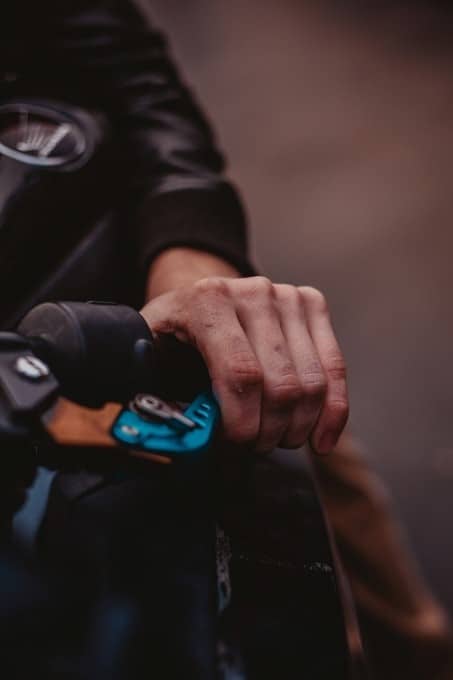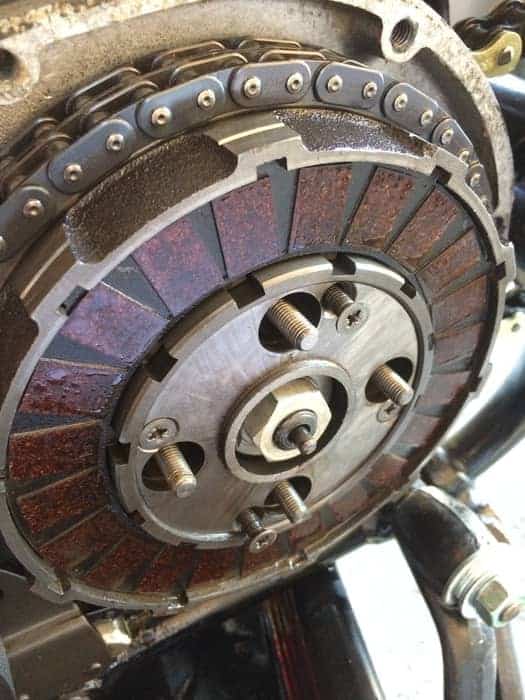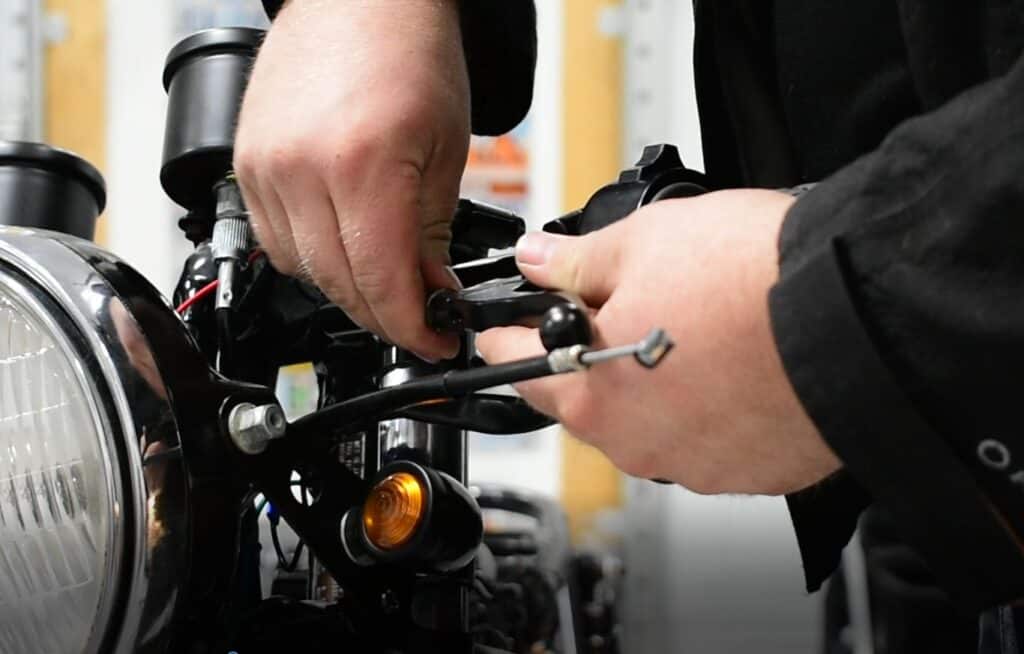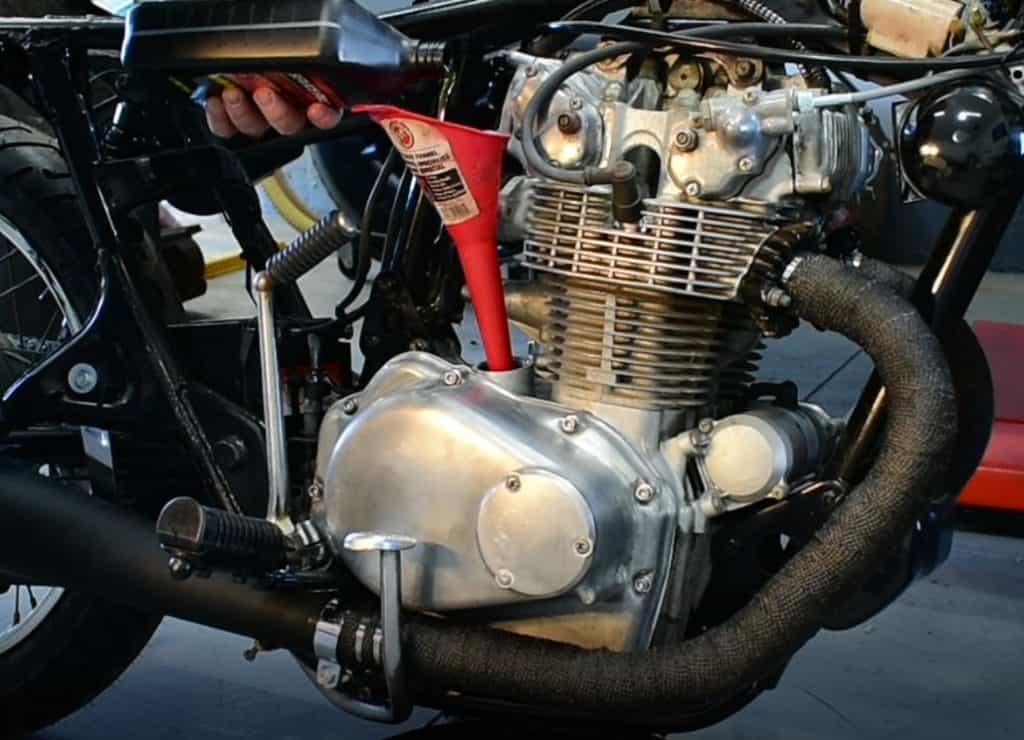
Imagine that you are riding your motorcycle down the road and suddenly notice that as you release the clutch lever, you hear a grind sound. Not a pleasant sound, right? As motorcycle riders, we know that a sound like this is never a good sign.
Why is my motorcycle making a grinding noise when releasing the clutch? A motorcycle makes a grinding noise when releasing the clutch because of worn clutch plates, worn clutch assembly, worn transmission gears or synchronizers, spent transmission oil, or poor clutch adjustment such as a misaligned clutch cable.
If you do notice a strange sound, you will want to determine what causes the sound. Does it happen only at certain speeds? Does it happen as you brake? Does it happen when you shift gears or into certain gears? There are a lot of different scenarios that can lead to different sounds and figuring out what exactly causes the sound that you are hearing can greatly aid you in finding and fixing the source of the problem.
Why Your Motorcycle Makes A Grinding Sound When Releasing The Clutch
As soon as you detect a strange sound on your motorcycle, it’s important that you look into it right away as this can directly impact your safety while riding your motorcycle and also prevent further damage.
Here we are focused on a grinding sound that occurs as you release the clutch. This is an easy one to catch because you are frequently shifting gears while riding a motorcycle. If you hear that sound, you will want to track down the source of the issue as quickly as possible.

One of the most common causes of a grinding sound associated with clutch release is worn clutch plates. Your clutch plates are what actually contacts the flywheel and the pressure plate. As these are contacting components, they do wear out over time. As the clutch plates wear out, they can then stop engaging properly. They could just slip or they could not work entirely. This can result in a grinding sound. If they are bad, they will need to be replaced.

The second common problem is an issue with how the clutch is adjusted. There are several different components that can affect this. The first is the actual clutch cable. If the clutch cable isn’t positioned properly, it might not actually be pulling enough to separate the gears.
As a result, the gears can grind. This can be fixed by adjusting the clutch cable so that it fully disconnects the gears. This could also be an issue with the hydraulic system that performs the shifts as well. To learn more about a motorcycle clutch going bad, see our other article here.
The clutch assembly may also be a culprit to a grinding sound while releasing the clutch on a motorcycle. While that may be the most common point of failure, that doesn’t mean it is the only component that can fail. Additionally, you could run into issues with the pressure plate, the clutch basket, or other internal components. Some of these components may include small springs, bolts, or other miscellaneous hardware. All of these components can wear out over time and as a result, can lead to a grinding sound.
Lastly, there are several different issues in the transmission that can lead to a grinding sound. First off, there could be an issue with the gears or the synchronizers. If these are suspect, you will want to get it looked at as soon as possible before worse transmission damage occurs. Additionally, a grinding sound could be something as simple as your transmission being low on transmission fluid.
How To Fix A Motorcycle Grind When Releasing The Clutch
So, if you run into any issues with a grinding clutch, how can you fix these issues? Some of the things that we have mentioned are relatively easy and can be done by anyone. Some of the more complicated issues require more experience and specialized tools in order to perform the job.
First off, if any component in your clutch assembly is worn, this probably falls in the middle difficulty-wise. Diagnosing which of the clutch assembly components is worn can be difficult if you aren’t familiar with them. If you are feeling confident enough, you can tackle this job. You can either replace the clutch in its entirety, or you can try to replace a single component.
If the problem is just the clutch cable, this is something that you can do yourself fairly easily. You can either replace the clutch cable with a brand new one, or you can try to adjust the one that you already have. Just be sure that when the clutch lever is pulled, that the gears are coming completely apart so that they don’t grind at all.
Lastly, if the issue is with your transmission, this could be either really easy or really difficult. If your problem is just low transmission fluid, you can add some very easily. You can also change the fluid out entirely without too much trouble. If the problem is related to the mechanical components of the transmission, this becomes a much more complicated job. Working on or replacing the transmission should only be done by someone very comfortable with working on motorcycle transmissions.
Is It Common For A Motorcycle To Grind When Releasing The Clutch?
You may be wondering if it’s common to have a grinding sound come from your motorcycle when releasing the clutch. While this isn’t an incredibly common sound, it does happen from time to time. Especially as your bike gets older and older, components wear more and more. This wear and tear is the most common reason for a grinding sound, whether that be from the clutch plates, other clutch components, or from the transmission.
While wear and tear is inevitable, that doesn’t mean that you will definitely hear a grinding sound when releasing your clutch on an old motorcycle. There are many bikes that never experience this issue. Usually that is because proper maintenance is done on the motorcycle regularly and repairs are made as soon as they are needed.
So, if your motorcycle does start grinding, can you ignore it for a while or keep riding your motorcycle? You should never ignore a grinding sound when you release your clutch, or any grinding sound for that matter. This is an obvious sign that something isn’t working properly in your bike.
Grinding essentially means that metal parts are rubbing against each other. Not only does that mean metal components are wearing each other out, but you risk metal shavings getting circulated throughout that component which can ultimately ruin other parts as well.
If you notice this grinding sound, you should react immediately. If there is an issue with your transmission, then ignoring it can lead to you needing to purchase an entirely new transmission. Perhaps you would’ve been able to prevent this by just adding some more transmission fluid or doing a transmission fluid flush and change. This can save you hundreds or thousands of dollars down the road.
How To Prevent Your Motorcycle From Having Clutch Release Grinding Again In The Future
So, maybe you’ve gone through this whole nightmare of trying to figure out the cause of this grinding and you never want to have to do it again. Are there things that you can do to ensure that this does not happen? While you may not be able to prevent it from ever happening, you can significantly reduce the likelihood of it happening through some basic routine care of your motorcycle.
The first and simplest thing that you can do is be on top of your routine maintenance. One of the common reasons for this issue is poor lubrication in your transmission. This is something that can easily be prevented by just monitoring the fluid level regularly and getting it flushed/changed when needed. This way you never have to worry about that being the cause of your problems.

Motorcycles have a combined engine block that includes the transmission. Regular oil changes every 5,000-7,000 miles or every year is a good routine to adopt to ensure nothing is grinding inside.
Another thing that you can do is store your motorcycle properly. A lot of the common reasons for this grinding sound are a result of wear and tear. Storing your motorcycle where it’s protected from the elements, can ensure that those components wear out as slowly as they were expected to. Keeping a motorcycle outside can increase the chances of UV damage from the sun as well as dirt and debris getting in place it shouldn’t.
The last thing that you can do is ensure that any work on the clutch, clutch cable, or transmission is done properly. Whether you are doing it yourself, or taking your motorcycle to a mechanic, ensure that the job is done well so that these problems don’t come back to haunt you in the future.
